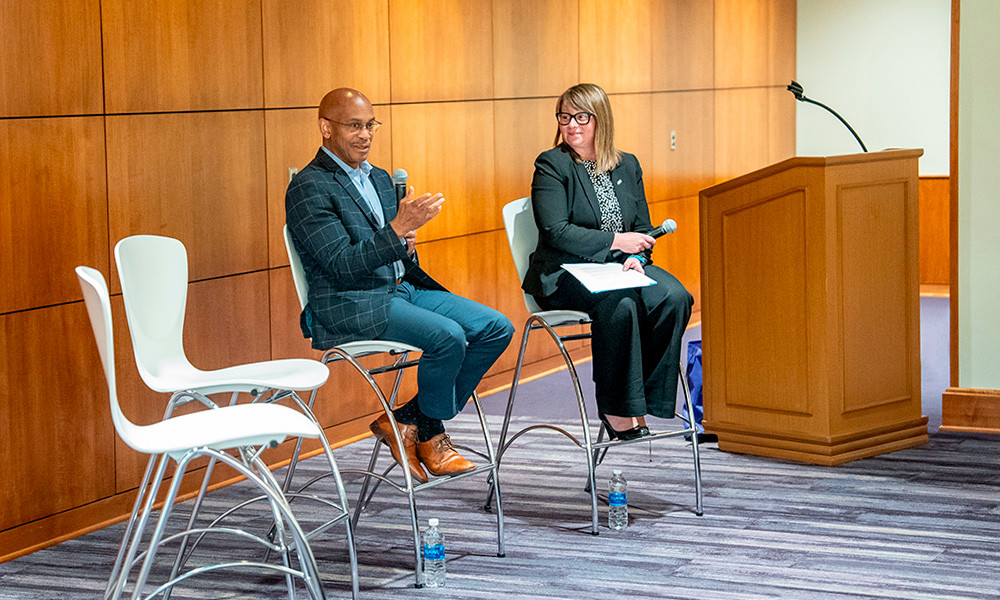City manager alum returns as guest speaker
Nation and World
SUMMARY: Marcus D. Jones (’90) returned to campus Oct. 22 as a guest speaker for the latest installment of JMU's Common Good Conversations series, hosted by the James Madison Center for Civic Engagement. Currently the city manager of Charlotte, North Carolina, Jones shared insights from his decades of public administration experience with students, faculty, staff and administrators.
Some people view local government as an impediment, a bureaucracy and a source of frustration.
JMU alumnus Marcus D. Jones (’90) has a decidedly different view. To him, local government can be innovative, exciting and even fun.
Jones, the city manager of Charlotte, North Carolina, returned to campus Oct. 22 as a guest speaker for the latest installment of the university’s Common Good Conversations series, hosted by the James Madison Center for Civic Engagement.
Jones, who met with Public Administration classes earlier in the day, told an audience of students, faculty, staff and administrators that local government can be a “laboratory” for innovation and problem-solving, as well as a vehicle for building community.
“There are so many things that we’re doing that change people’s lives forever,” he said. “We have these opportunities to build relationships, not within the departments in City Hall, but … with the philanthropic community, with the business community, with the neighborhoods … where you’re taking on issues and solving problems.”
|
”We have these opportunities to build relationships, not within the departments in City Hall, but … with the philanthropic community, with the business community, with the neighborhoods … where you’re taking on issues and solving problems.” — Marcus D. Jones (’90), city manager, Charlotte, North Carolina |
Charlotte is one of the fastest-growing cities in the country. Between 2022 and 2023, 117 people relocated there every day. In addition to being a corporate hub, the Queen City is home to three professional sports franchises, the NASCAR Hall of Fame and a major international airport, and it boasts a cost of living “head-and-shoulders less expensive than any other big city in North Carolina,” Jones said.
But none of that means much, he said, if local government isn’t responsive and accountable to residents. “You really don’t get credit for the water coming on every day or the toilet flushing, or the stoplights working,” he said. “That’s our job. But when something goes wrong — no matter how many consecutive days things may have gone right — that’s when you hear from people.”
Jones oversees more than 9,000 city employees and manages a $4-billion budget focused on public safety, operations and infrastructure.
There’s a perception among some people that government employees don’t work hard, Jones said, but that has not been his experience. “We have three lines of work in Charlotte. We have police, fire and rescue [crews who] never take a day off. Then we have trash collectors and street pavers who work a set schedule, 40 hours a week, whether it’s four days or five days. And then we have professionals like architects, engineers and planners who work a lot of hours but also have a lot of flexibility with their schedules. … What we try to do is to make sure that we are all one team with one vision — providing the best municipal services in the country, period.”
Building trust with constituents is critical, Jones said, adding that he prioritizes trust over transparency, since city managers can’t always disclose certain information due to safety concerns. Officials and residents need to hold each other accountable, he said.
Jones shared the results of a study that found that residents’ affinity for their home city tends to follow a bell curve. On the ends of the spectrum are people who either love their city or hate it. “And somewhere in the middle of the curve,” he said, “people are bored.”
Jones is interested in engaging this middle group, beginning with younger residents. Charlotte has implemented a program that connects high-school seniors from local Title I schools with good-paying service jobs in the city and other initiatives aimed at retaining young people and creating career pathways. “If we can keep them curious and provide them with opportunities, they may not be as disconnected,” he said.
Madison Center Interim Director Kara Dillard, who facilitated the discussion, asked if, in this era of political polarization and mistrust, city managers can remain neutral. Jones replied he does not focus on the politics at play, but rather on implementing policies once they have been adopted by the mayor and the city council. “How we get to the policy is less important to me,” he said.
Madison Center Democracy Fellow Jameson Balda and Facilitation Fellow Bubuney Havi asked Jones about some of the challenges city managers face and the skills needed to succeed in the profession. Jones advised students to adopt an “innate curiosity” about how things work and to take every opportunity to build relationships with professionals in the field.
